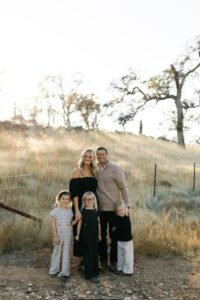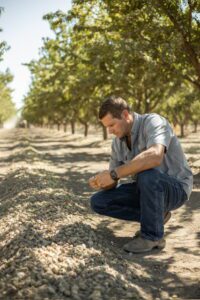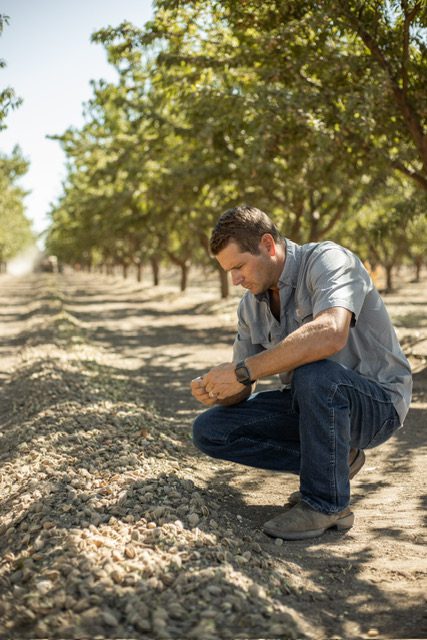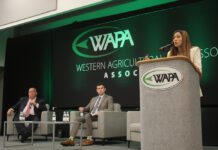Like a lot of young people who grow up on a farm, Connor Wagner of Wagner Land Co. wanted to do something else. After growing up on his family’s dairy farm, he went to college and studied dairy science, but after college he went to work on the processing side of the industry. But there was always something about the farm life that appealed to him. Unlike many young people who leave the ag industry, he came back to the family farm, drawn by the lifestyle it offered his family and the opportunity to be his own boss.
Now, Wagner farms 170 acres of his own almond and pistachio trees and another several hundred acres in cooperation with his brothers. Wagner values the wisdom he has gleaned from the previous generations of growers, but he is also excited to put his own stamp on the industry.

We asked him to share with West Coast Nut his thoughts on advancements in the almond industry along with his hopes for the future.
Q. Tell us a little bit about the history of your farming operation.
My grandfather came from Switzerland and started a dairy in the ’40s. My dad grew the business and diversified into trees in 2007, and now he has three sons, including myself and a son-in-law, in the dairy/farming business.
Q. Being in the industry your whole life did you ever consider doing something else?
Out of college I got a job for Ecolab, which is a chemical manufacturing company. I studied dairy science, and so that job took me into cheese processing plants and food processing plants, and I thought of coming back and starting a cheese company for the dairy because I grew up on dairy. I tried something else and didn’t like the corporate life. So, I came back to work for the family, and we’ve grown the dairy farming operation with my brothers.
Q. A lot of growers in the industry talk about how young people don’t want to stay on the farm. What made you want to come back?
Probably the lifestyle that it would provide my family. I had a corporate job, and I didn’t like it because all of the people I had to answer to. I came back because I enjoy problem solving, so if I identify a problem, it’s up to me to fix it. I love the freedom. You really can’t get that anywhere else. We have grown the business so that each sibling has their own autonomy and can stay out of each other’s way. Family can be hard to work with, but I feel we have done a good job and made it enjoyable. It’s a lot of hard work too. During harvest, I’m out there in 115-degree [F] weather fixing something, and that’s not very glamorous, but I love it. I am building a harvesting business, which is fun to me because I get to build something that’s separated from everything else. I have identified an avenue, and I’m going to go that way. My wife and I also got our real estate licenses. I sell ag land, and my wife does residential, so that’s another avenue.

Q. How have your farming practices evolved in recent years? What new production practices have you embraced and why?
With the third generation taking over the business, we are utilizing new technologies available to us in order to save water and money and to produce higher yields.
A couple years ago, we started pressure bombing. We used to use just ET calculations and then we started pressure bombing. That helped improve our water usage and also when to start irrigating. We then started using Phytech, which uses a dendrometer on the tree trunk to measure the expansion and contraction of the tree trunk. So, every day the tree swells up as it takes in water and then every night it contracts a little bit. This happens on a scale of microns, so it’s really small, but if you’re not irrigating enough, the trunk will start to shrink. It helped us figure out when to start irrigating and has been a huge help.
There are other things like VFD pumps. We’re trying to get more efficient. We also put in solar panel projects to offset the cost of our electricity at the ranches.
Q. What advancements do you foresee having a big impact in the future?
Zero- or low-dust harvesting. I think that’s going to change the industry a lot. As we move forward, I think regulations are going to come in and kind of force us to go low dust or no dust. So, what I’m doing is trying to build a harvesting business around low dust harvesting. Previously we had somebody custom harvest for us, and so I figured why not buy the equipment to do it myself. Equipment is expensive, so I am growing a little every year. We still rely on some custom work. What I’m trying to do is buy pistachio equipment, which is zero dust, and utilize it in the almonds. I am trying to get ahead of the game a little bit where I can. But it’s tough because if your orchard isn’t planted correctly, you can’t really use the pistachio equipment there. If you plant it kind of like pistachio orchard you can utilize zero dust harvesting in those orchards.
Q. Is that changing your thought process when you plant new trees?
We haven’t put in new trees yet, but we will soon, and that will definitely influence how I plan the next orchard.
Q. Do you think that the industry as a whole will go that way?
That would take a lot of time. It’s kind of hard to get an old farmer to change his ways, which makes sense. You know, if it worked for him for 30 years, I wouldn’t change either, but I’m young and I’m trying to do things to save money. I have to be efficient if I’m going to start a harvesting business or continue to be a farmer, so I think at the end it will, but it would take a lot of time.
Q. Do you see any other advancements in either tech or in the way young people are coming in and making changes that you think is going to impact the future?
That’s tough because I’m pretty new. I’m young when it comes to farming almonds, so it’s hard to say. I’ve been farming my whole life but we started farming almonds in 2007 when I went off to college. I came back, and I’ve been farming my own since 2017. It’s been a large learning curve. I mean, since 2017, we’ve had some of the biggest rains on record, the pandemic which led to one of the largest dips in prices for almonds we’ve had since the 80s and it’s still going. It’s just really tough to get a grip on the industry, and tech is coming in, but it’s kind of hard to implement it when a lot of it is unproven. Like I said earlier, you kind of learn from the older generation, so you do what they do and then adopt your own stuff as you feel comfortable. That’s kind of why tech is kind of slow moving into ag, I think, but as the years go by, I think more younger people like me will adopt it.
Q. What are the three things that keep you up at night related to growing almonds?
Being at the mercy of mother nature, you can’t let things keep you up at night because you can’t control most things related to growing and farming. What keeps me up at night are human-caused problems affecting our business, and those include government regulations, inflation, taxes and interest rates.
Q. What are you most hopeful for in the future when it comes to farming, almonds?
I hope my children will want to farm or be able to still farm in California. Every year gets harder, but it provides an enjoyable life so I want them to have an option to be able to farm.
Q. What is your proudest achievement as it relates to your professional development?
Planting my own orchards and watching them grow. I am starting a harvest business that I keep growing every year, so when the harvest season is over, I am proud of all the hard work I put in to make the harvest happen successfully.
Q. What advice do you have to a young person getting into farming nuts today?
There are a lot of opportunities in any direction you go, so work hard at it, always learn from your mistakes because you will make them, and don’t give up.
Q. Who was the biggest influence or mentor for you in your nut farming career?
My oldest brother. He is a great businessman and is always there for me when I have questions for him.
Q. Can you talk a little bit about being involved in the local community?
Being in real estate, we have to be a part of the community, and I can thank my wife for that. We live in Ripon. It’s a small farming community with a lot of almond growers. She worked for the Ripon Chamber of Commerce and got to know a lot of good people and those people she introduced to me. She is on the board of directors for Garden Joy. It’s a non-profit garden in Ripon, and the schools go there to teach the kids how to garden and how to farm. It’s nice because we’re trying to get young people into farming and learn the responsibility of it. I think it’s a great thing for our farming community. My wife, Tara, just became a board member maybe four to six months ago, but that’s something that we hope to expand on.











